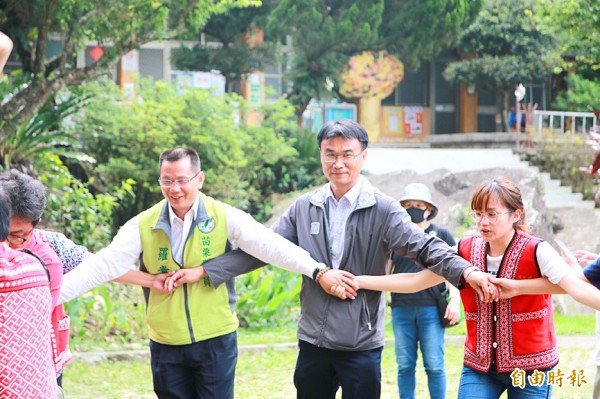《TAIPEI TIMES》 COA allows agriculture in some forests

Miaoli County Councilor Lo Kui-hsing, first left, and Council of Agriculture Minister Chen Chi-chung, second left, join a traditional Saisiyat dance in Miaoli County yesterday. Photo: Cheng Ming-hsiang, Taipei Times
MORE DIVERSITY: The council has allowed raising bees, and growing mushrooms and Taiwan jewel orchids in certain forested areas to boost Aborigines’ incomes
By Lin Chia-nan / Staff reporter
Agricultural activities such as beekeeping and growing mushrooms are now allowed in certain forested areas that were reserved for growing trees, the Council of Agriculture (COA) said yesterday.
Forestry development has led to conflicts between authorities and Aboriginal communities, and limited Aborigines’ incomes, Forestry Bureau Director-General Lin Hwa-ching (林華慶) said.
To boost Aborigines’ incomes and introduce better forestry products to consumers, the bureau on April 18 eased the regulations on agricultural activities on privately owned forests, fields reserved for Aborigines and government-owned forests on lease, he said.
People are allowed to raise bees to collect honey and grow mushrooms and the medicinal Taiwan jewel orchid in the areas, Lin added.
However, they must first apply to the council and ensure that their activities would not destroy forest ecology, he said, adding that more crops would be added to the list.
The average yearly income of a forest worker selling timber was about NT$115,000 per household in 2015, the bureau said.
Due to their low income, many forest workers turned to growing fruit or tea on mountainous fields without caring for soil or water conservation, it said, adding that some even illegally leased land unsuitable for farming.
If Aborigines can make money from more diverse, legal farming activities, young people returning home would have stable incomes, COA Minister Chen Chi-chung (陳吉仲) said at a meeting with Saisiyat Aborigines at an elementary school in Miaoli County’s Nanjhuang Township (南庄) yesterday .
They can make money by selling agricultural products while promoting their culture, Chen said, adding that the council would help promote the honey products.
Beekeeping had been part of Saisiyat life, but it was lost a long time ago, said community elder Dain Na Davoh, also known by his Chinese name Ken Chih-yu (根誌優).
Bureau officials started teaching beekeeping to community members in June last year, after the two sides reconciled in a ceremony to resolve past conflicts about forest development, he said.
Despite initial doubts, community members collected honey from their first beehive in December last year and protected the bees from cold weather during the winter, when the temperature in the mountains once dropped to 2°C, he added.
The community has 100 beehives now, he said, expressing the hope that new farming activities would solve the community’s three shortages — money, labor and expertise — and attract more visitors to the area.
新聞來源:TAIPEI TIMES
%http://www.taipeitimes.com/
















